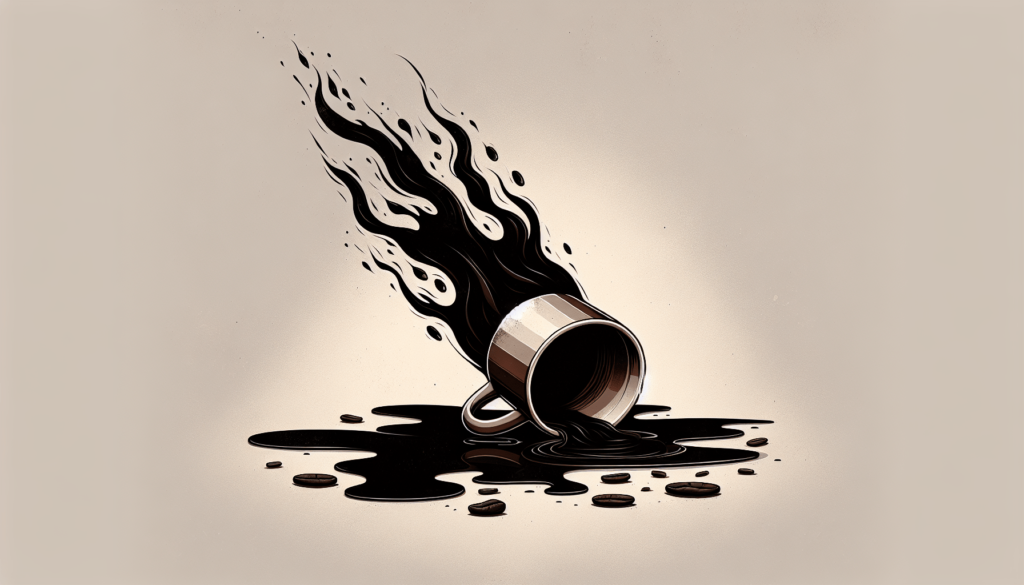Have you ever wondered about the negative effects of drinking coffee? While coffee is a beloved beverage for many around the globe, it’s important to consider the potential downsides that come with its consumption. In this article, we’ll dive into the negative effects of drinking coffee, shedding light on what happens when you indulge in that morning cup or afternoon pick-me-up a bit too often.
The Impact on Sleep
Disruptions in Sleep Patterns
You might love having a cup of coffee in the afternoon or evening, but did you know it can disrupt your sleep patterns? Caffeine is a stimulant that can affect your ability to fall asleep and stay asleep. This disruption can lead to a decrease in the quality and quantity of your rest.
Insomnia
If you’ve ever tossed and turned in bed after a coffee-filled day, you’re not alone. Insomnia is a common consequence of excessive caffeine intake, particularly if consumed later in the day. A restless night can affect your mood, productivity, and overall health.
Anxiety and Stress
Increased Anxiety Levels
While coffee can give you an energy boost, it can also increase your anxiety levels. The caffeine in coffee stimulates your central nervous system, potentially leading to feelings of nervousness, jitteriness, and increased heart rate. If you’re prone to anxiety, it might be worth considering your coffee consumption.
Stress and Tension
Caffeine can put your body into a heightened state of stress. When you consume coffee, it triggers the release of stress hormones like cortisol, which can elevate your stress levels and lead to physical tension.

Digestive Issues
Acid Reflux and Heartburn
Do you often experience heartburn after drinking coffee? Coffee is acidic, which can cause or exacerbate acid reflux and heartburn. This acidity stimulates the production of stomach acid, potentially leading to discomfort.
Gastrointestinal Distress
Coffee can also lead to gastrointestinal distress, such as nausea or stomach cramps. This is particularly true if you consume it on an empty stomach, which can irritate your digestive tract.
Dependence and Withdrawal
Caffeine Dependence
If you can’t imagine starting your day without coffee, you might have developed a dependence on caffeine. Over time, your body can become reliant on caffeine to function normally, making it difficult to cut back or quit.
Withdrawal Symptoms
When you try to reduce your coffee intake, you might experience withdrawal symptoms such as headaches, fatigue, irritability, and difficulty concentrating. These symptoms can make it challenging to reduce your caffeine consumption.

Cardiovascular Concerns
Increased Heart Rate
Coffee’s stimulant properties can increase your heart rate and blood pressure, which may put additional strain on your cardiovascular system. This effect is particularly concerning for individuals with preexisting heart conditions.
Risk of Heart Disease
Long-term excessive consumption of coffee might be linked to an increased risk of heart disease. While research in this area is ongoing, it’s essential to be mindful of your intake, especially if you have other risk factors.
Bone Health
Calcium Absorption
Did you know that coffee can interfere with calcium absorption? Caffeine can reduce the amount of calcium your body absorbs, which may weaken your bones over time. This is particularly concerning for individuals who are at risk of osteoporosis.
Bone Density
Regular high intake of coffee might be associated with decreased bone density. If you’re concerned about your bone health, it could be a good idea to limit your intake and ensure you’re getting enough calcium from other sources.
Effects on Pregnancy
Risks During Pregnancy
If you’re pregnant, it’s especially important to monitor your coffee consumption. High caffeine intake during pregnancy has been linked to an increased risk of miscarriage, low birth weight, and preterm birth. Always consult with your healthcare provider about safe caffeine levels during pregnancy.
Impacts on Fetal Development
Caffeine can cross the placenta and affect your developing baby. Excessive consumption can lead to changes in your baby’s sleep patterns and movements, potentially impacting their overall development.
Psychological Effects
Mood Swings
Coffee can cause fluctuations in your mood. While that morning cup might elevate your spirits, excessive caffeine can lead to mood swings and irritability. It’s a rollercoaster ride you might want to avoid.
Dependency and Mental Health
Relying on coffee for your daily energy can create a psychological dependence. This reliance might affect your mental well-being, leading to feelings of anxiety and stress when you can’t get your caffeine fix.
Conclusion
In summary, while coffee has its perks, it’s essential to be mindful of the potential negative effects that come with its consumption. Disruptions in sleep, increased anxiety, digestive issues, dependence, cardiovascular concerns, bone health, effects on pregnancy, and psychological effects are all factors to consider.
By understanding these impacts, you can make more informed choices about your coffee intake and prioritize your health. Whether it’s reducing your daily cups or switching to alternatives, taking a mindful approach to coffee can help you enjoy its benefits without compromising your well-being.
